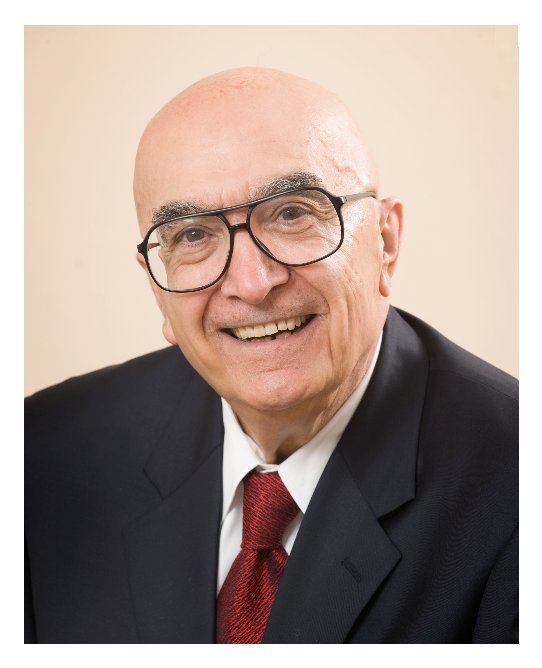

Born in Iran, Lotfi Mansouri attended the University of California, Los Angeles, and received U.S. citizenship before serving as resident stage director at Zurich Opera from 1960 to 1966. In 1965 he started working simultaneously at the Geneva Opera, where he became stage director in 1966 and remained until 1976. During this period, he began fulfilling engagements as guest director at various houses throughout Italy and North America, including Chicago, Houston, Santa Fe, Philadelphia, San Diego, Dallas, and both the Metropolitan and New York City Opera companies. In 1976 he was named general director of the Canadian Opera Company in Toronto, where he directed 30 new productions, 12 of them Canadian premieres. Mansouri introduced supertitles in January, 1983, and this is generally regarded as the first use of such a translation system. As San Francisco Opera's general director from 1988 to 2001 and currently general director emeritus, began his association with the company in 1963, when he staged six productions. He has since staged more than 60 productions there. In 1992 he became a Chevalier of the Ordre des Arts et des Lettres by the government of France, and is the subject of a 1998 biography by Joan Chatfield-Taylor, An Operatic Odyssey: Lotfi Mansouri and San Francisco Opera. He is the author of Lotfi Mansouri, An Operatic Life, and his film credits include operatic portions of 'Moonstruck' and 'Yes, Giorgio' starring Luciano Pavarotti. The National Endowment for the Arts honored Mr. Mansouri at the NEA Opera Honors in November 2009. |
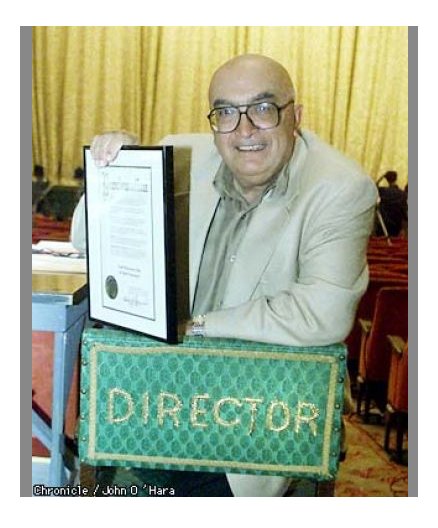 BD: Does having a
background in psychiatry help you in directing?
BD: Does having a
background in psychiatry help you in directing?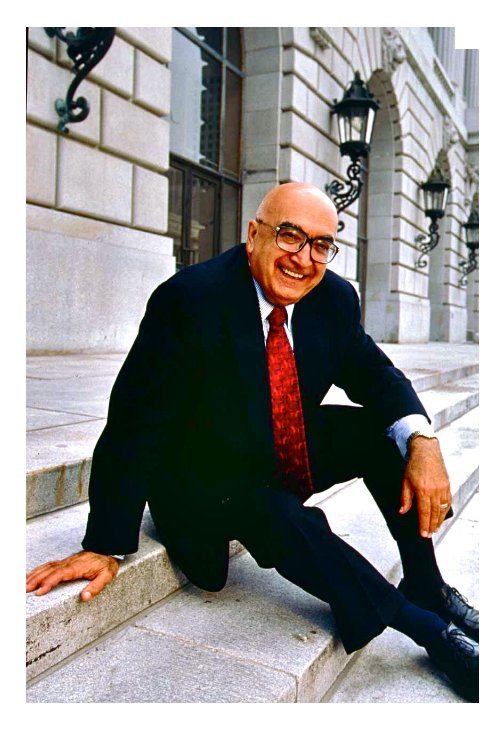 LM: Oh yes, and you could
work on the different characterizations
for Pousette and Javotte and the Innkeeper and all these little
vignettes. The hotel Transelvanie is a wonderful scene, and Guiot
de Montforte would have been a wonderful role for George Sanders.
It’s a very good piece of theater. Another opera I’ve very much
enjoyed doing – and it cost a fortune – was Louise by
Charpentier. I was fortunate – I got the original sets from the
Opéra-Comique and they were breathtaking. I did it in
Geneva. Rossi-Lemeni was the father and Louse was Suzanne
Sarocca, a charming
French singer. The mother was Solange Michel, who had done the
role with Charpentier. She was a kind, helpful lady who taught
me, for example, how Charpentier had
said what they do at the table, how they bless before they start the
supper. It’s a dramma-musicale
– it’s like a novel not a real
opera.
LM: Oh yes, and you could
work on the different characterizations
for Pousette and Javotte and the Innkeeper and all these little
vignettes. The hotel Transelvanie is a wonderful scene, and Guiot
de Montforte would have been a wonderful role for George Sanders.
It’s a very good piece of theater. Another opera I’ve very much
enjoyed doing – and it cost a fortune – was Louise by
Charpentier. I was fortunate – I got the original sets from the
Opéra-Comique and they were breathtaking. I did it in
Geneva. Rossi-Lemeni was the father and Louse was Suzanne
Sarocca, a charming
French singer. The mother was Solange Michel, who had done the
role with Charpentier. She was a kind, helpful lady who taught
me, for example, how Charpentier had
said what they do at the table, how they bless before they start the
supper. It’s a dramma-musicale
– it’s like a novel not a real
opera.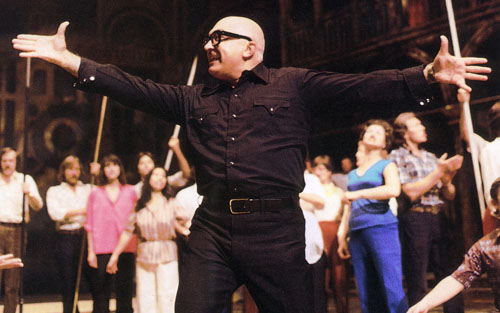 LM: I hate to
generalize. We just did Jenůfa
in
English, and I think it would have been rather snobbish to have done it
in Czech. Doing it in English involved the audience
to such a point that whatever you would have lost in the subtle
nuances, you gained in the direct communication with the audience and
their involvement. We did the new 3-act Three Act version of Lulu that was in English, and I
think Lulu is tough enough so
I didn’t
want yet another barrier. I wanted the audience to get involved
in the piece.
LM: I hate to
generalize. We just did Jenůfa
in
English, and I think it would have been rather snobbish to have done it
in Czech. Doing it in English involved the audience
to such a point that whatever you would have lost in the subtle
nuances, you gained in the direct communication with the audience and
their involvement. We did the new 3-act Three Act version of Lulu that was in English, and I
think Lulu is tough enough so
I didn’t
want yet another barrier. I wanted the audience to get involved
in the piece. 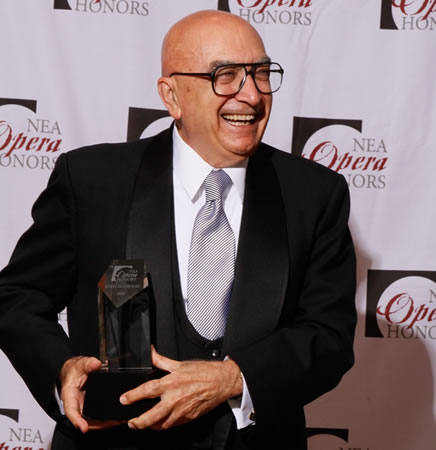 LM: I’m an
optimist. I like to think that opera is
developing. In the ‘50’s was the symphonies – after the war and
the long playing record, the symphonies had a nice boom. Then in
the ‘60’s came the ballet which became very much “the”
thing. Now the time has come for opera. In the last
10 ten years, there has been over 100% growth in opera in North America.
LM: I’m an
optimist. I like to think that opera is
developing. In the ‘50’s was the symphonies – after the war and
the long playing record, the symphonies had a nice boom. Then in
the ‘60’s came the ballet which became very much “the”
thing. Now the time has come for opera. In the last
10 ten years, there has been over 100% growth in opera in North America.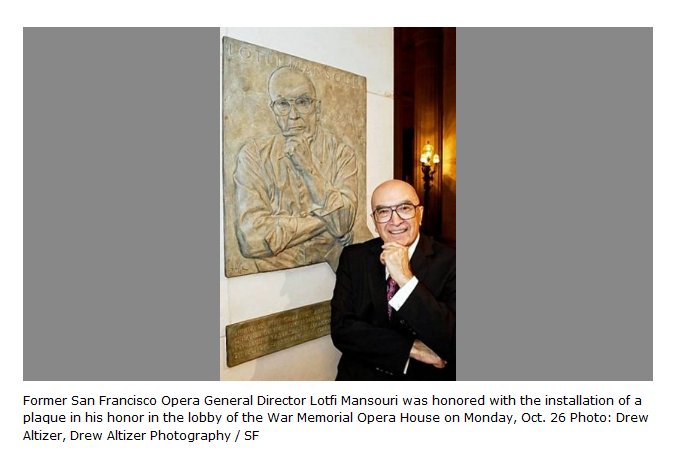 LM: I find that visual
media – films and TV – have to find new
techniques for opera. You cannot just go in and shoot an opera
performance. I’d rather see them go ahead and start, and learn
from their mistakes. There have been some magnificent opera films
– mostly made by the Russians. Their Boris is a realistic film; they
shot it all in the real locations. In the
‘50’s the Italians filmed operas, and some are quite good.
Everybody
says the story of Trovatore
is nonsense, but I tell them to see this
old Italian film. Every time there was an aria, they showed a
flashback of what was happening, so you saw what was being sung
about. The trouble with Trovatore
is that all the action happens
offstage and they talk about it. So if you don’t know what
they’re talking about, you won’t get the story.
LM: I find that visual
media – films and TV – have to find new
techniques for opera. You cannot just go in and shoot an opera
performance. I’d rather see them go ahead and start, and learn
from their mistakes. There have been some magnificent opera films
– mostly made by the Russians. Their Boris is a realistic film; they
shot it all in the real locations. In the
‘50’s the Italians filmed operas, and some are quite good.
Everybody
says the story of Trovatore
is nonsense, but I tell them to see this
old Italian film. Every time there was an aria, they showed a
flashback of what was happening, so you saw what was being sung
about. The trouble with Trovatore
is that all the action happens
offstage and they talk about it. So if you don’t know what
they’re talking about, you won’t get the story. 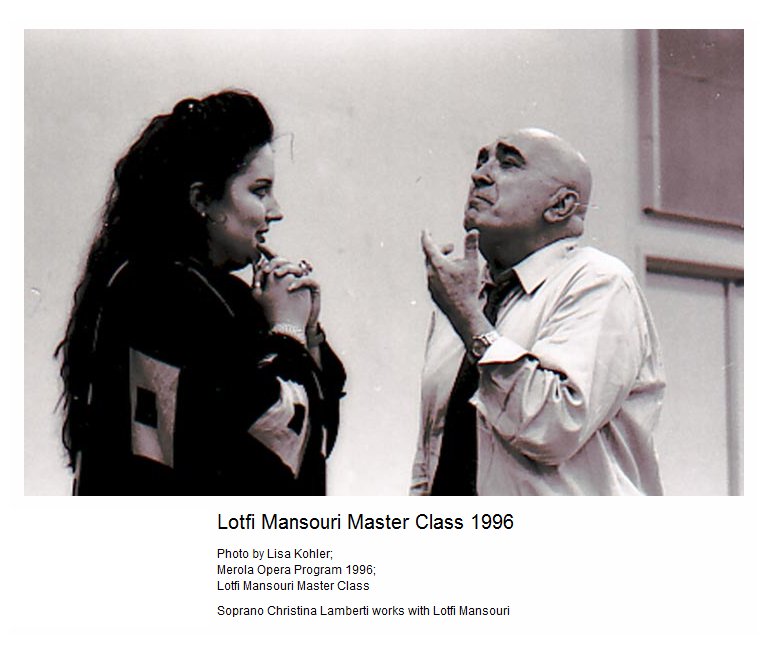 LM: Some do. Some
get up and walk out, and some new
people will come to Lulu.
After people left Lulu,
others stayed
and cheered to the rafters at the end of it. I also get nasty
letters saying that if they wanted fornication, they knew where they
could go for that.
LM: Some do. Some
get up and walk out, and some new
people will come to Lulu.
After people left Lulu,
others stayed
and cheered to the rafters at the end of it. I also get nasty
letters saying that if they wanted fornication, they knew where they
could go for that. This interview was recorded at Mansouri’s apartment in Chicago on May 11, 1982. A portion was transcribed and published in Nit & Wit Magazine in November, 1986. The complete conversation was re-edited for this website posting in 2012.
To see a full list (with links) of interviews which have been
transcribed and posted on this website, click here.
Award - winning broadcaster Bruce Duffie was with WNIB, Classical 97 in Chicago from 1975 until its final moment as a classical station in February of 2001. His interviews have also appeared in various magazines and journals since 1980, and he now continues his broadcast series on WNUR-FM, as well as on Contemporary Classical Internet Radio.
You are invited to visit his website for more information about his work, including selected transcripts of other interviews, plus a full list of his guests. He would also like to call your attention to the photos and information about his grandfather, who was a pioneer in the automotive field more than a century ago. You may also send him E-Mail with comments, questions and suggestions.